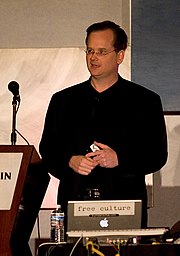現在翻訳作業中!
●注意:以下の文章は、作業途中の文章です。時間があるときに少しずつ翻訳作業をしているので、誤訳・不適切な用語・意味不明な文章のままになっていて、間違いだらけのノートのようなものであり、正確さを欠きます。そのため、現時点ではあまり参考にはならないと思いますが、それは翻訳途中の文章を掲載している私の怠慢と翻訳能力不足のせいであって、オリジナル文章のクオリティが低いわけではありません、たぶん。閲覧する際は、その点をご注意ください。不完全な文章を読むと訂正などのツッコミを入れたくなると思います。なので共同作業者も募集中です。一緒に訳しましょう。これらは、wikiで現在編集制限していないので誰でも編集できます。直しちゃったり、加筆しちゃったり、を歓迎します。貢献しだいで翻訳精度や情報の信頼性は向上し、情報量は増大しますよ。また、「こんなとこでちまちまやってないでWikipediaに直接執筆すればいいじゃん」と思う人もいらっしゃると思います。ごもっともです。そういう方で元気がある方はどんどんWikipediaに新規執筆、加筆、翻訳をしてください。この翻訳中の文章は、実際に項目を書く前の下書き、下調べのようなものなのです。ある程度の精度の翻訳になった場合には、本家Wikipediaに掲載する予定でいます。お問い合わせは、メール drill.xx(at)gmail.comまで。
Free Culture movement
出典: フリー百科事典『ウィキペディア(Wikipedia)英語版』
| 出典: http://en.wikipedia.org/wiki/Free_Culture_movement |
| 2007-09-20T09:23:12 より翻訳中。 |
| 主な執筆者: Charlieage、Briaboru、Skyfaller、Philthecow、TitaniumDreads、Jmabel、Innovati 他。 |
The '''free culture movement''' is a social movement that promotes the freedom to distribute and modify creative works, using the Internet as well as other media.
フリーカルチャー運動は、インターネット上での創造的な作品の配布や改変を他のメディアと同じように行うための自由を促進する社会運動である。
The movement objects to overly restrictive copyright laws, or completely reject the concepts of copyright and intellectual property, which many members of the movement also argue hinder creativity. They call this system "permission culture".
この運動は過剰に制限された著作権法に反対し、著作権と知的財産権の概念を全く認めず、それが創造性を妨げていることについてこの運動の多くの参加者は討論を行う。彼らはこのやり方を「容認文化」と呼んでいる。
この運動は過剰に制限された著作権法に反対し、著作権と知的財産権の概念を全く認めず、それが創造性を妨げていることについてこの運動の多くの参加者は討論を行う。彼らはこのやり方を「容認文化」と呼んでいる。
Organizations
The organization commonly associated with free culture is Creative Commons (CC), founded by Lawrence Lessig. Lessig is a law professor at Stanford University and a prominent figure in the free software movement. He wrote a book called ''Free Culture'', which provides many arguments in favor of the free culture movement.
The student organization FreeCulture.org is sometimes confusingly called "the Free Culture Movement," but that is not its official name. The organization is a subset of the greater movement.
Free Software Foundation
The free culture movement takes the ideals of free software movement and extends them from the field of software to all cultural and creative works. At the beginning, Richard Stallman (founder of the Free Software Foundation and the free software movement) supported the Creative Commons, but at some point he rejected it:
{{quote|I no longer endorse Creative Commons. I cannot endorse Creative Commons as a whole, because some of its licenses are unacceptable. It would be self-delusion to try to endorse just some of the Creative Commons licenses, because people lump them together; they will misconstrue any endorsement of some as a blanket endorsement of all. I therefore find myself constrained to reject Creative Commons entirely.
Wikimedia
Wikimedia's projects, such as the popular Wikipedia, which are licensed under the GNU Free Documentation License and different Creative Commons licences, arguably constitute the largest single free culture project.
Based on ideas of the free culture movement, Wikimedia founder Jimmy Wales also has announced ten challenges for the movement in general with meta:Transwiki:Wikimania05/Presentation-JW1|A Free Culture Manifesto at the Wikimania 2005.
According to Jimmy Wales, those 10 things that should be free within the next decade are:
- Encyclopedia — in all languages; Wikipedia
- Dictionary — in and for all languages; Wiktionary
- Curriculum — in every language and for every grade; Wikibooks, Wikiversity
- Music — Wikimedia Commons
- Art — Wikimedia Commons
- Free file formats
- Maps — Wikimedia Commons
- Identifier
- TV listings
- Community
Former board member and trustee Tim Shell, however, suggests that the Wikimedia Foundation's use of free content was not meant to be an ideological position:
{{quote|For example, should we have an official position on the free culture movement? Wikimedia is part of that movement, but I would say this is so because of practical considerations, rather than ideological ones. It was assumed that people would be more willing to contribute to wikipedia if they knew their work could not be seized and owned by someone else, and it was decided that all contributions would be licensed accordingly.
== See also ==
- Copyleft
- Cultural environmentalism
- FreeCulture.org
- Open educational resources
- Gratis versus Libre (free as in beer)
★作業記録・メモ・質問などはこちらからもどうぞ。

